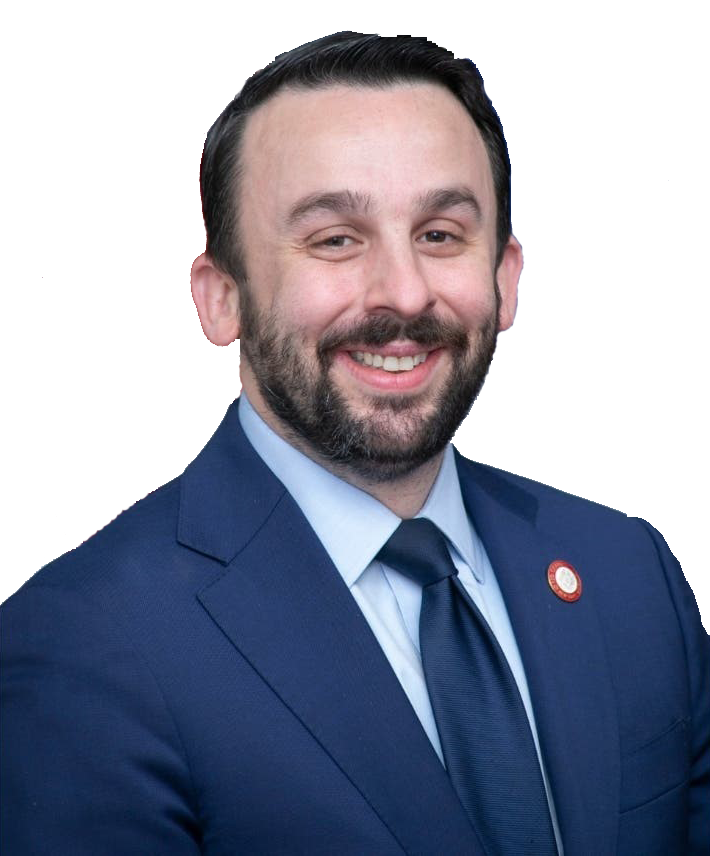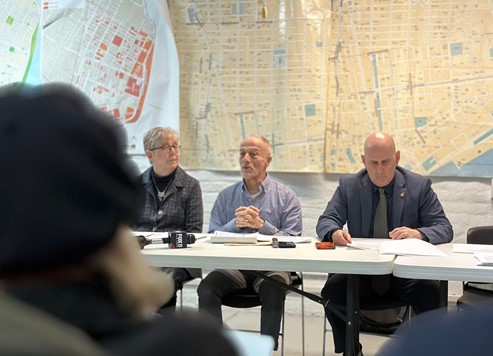Lower Manhattan Health Activists Release Health Equity Impact Study: Beth Israel Closure Would Harm People with Disabilities and Low Incomes, Elderly
Report sent to New York State Health Commissioner James McDonald, who must decide whether to approve the Mount Sinai Health System’s request to close Beth Israel
New York, NY – Members of the Community Coalition to Save Beth Israel and NYEEI were joined by Assemblymember Harvey Epstein and State Senator Kirsten Gonzalez today to release a report on the results of a community-led health equity impact assessment of the consequences of closing Beth Israel Medical Center. The report – Lower Manhattan Lifeline: What Beth Israel Medical Center Means to Local Residents – has been sent to New York State Health Commissioner James McDonald, who must decide whether to approve the Mount Sinai Health System’s request to close Beth Israel.
Because closings of entire hospitals are unfortunately exempt from a new state law requiring independent assessments of the likely impact of hospital service reductions or eliminations on medically underserved people, the Mount Sinai Health System was not required to commission a health equity assessment. The community coalition stepped forward to do its own assessment, which included a survey to which more than 900 local residents responded. Lois Uttley, co-founder of Community Voices for Health System Accountability, guided the study and said it found that:
- Lower Manhattan is seriously lacking in hospital capacity. Below 14th Street, there is only one full-service hospital with 180 beds for more than 300,000 people. That’s less than one hospital bed per 1,000 people – far below the state and national averages of 2.4 beds per 1,000 people.
- Closure of the nearest hospital above 14th Street -- Beth Israel -- would send people needing emergency care to Bellevue and NYU Langone, which are already “high volume” ERs with average wait times of more than three hours.
- People with disabilities and frail elderly people, some of whom have depended on Beth Israel for their entire lives, are terrified of losing what they regard as their community hospital and worried about the cost and physical challenges of traveling to uptown Mount Sinai hospitals.
- The zip codes from which significant percentages of Beth Israel patients are drawn – especially 10002 – include some of the city’s poorest residents, higher-than-citywide rates of public insurance, speaking a language other than English at home, and having only a high school or less education. These are the very people who told our surveyors they fear the closure of Beth Israel will leave them without nearby hospital care.
“There are massive equity implications to Mount Sinai’s attempt to close Beth Israel Hospital,” said Assembly Member Harvey Epstein. “The results of the health equity impact survey show that people with disabilities and low-income folks will suffer the most. The closure of MSBI would disproportionately impact the most vulnerable people in our community. We will not stop fighting to preserve this vital neighborhood hospital.”
“The impact of closing MSBI could not be clearer. Every day I hear from constituents who are concerned about disruptions to their health services, and who are worried about longer ambulance rides and increased wait times at other ERs,” said Senator Kristen Gonzalez. “Thanks to the Community Coalition for uplifting the stories of those who would be most harmed by MSBI’s closure—those who are elderly, low-income, or have disabilities. Strong community healthcare systems save lives, and I will continue fighting to protect access to these essential health services for the most vulnerable in our community.”
“Community Board 3 opposes the closing of the Mount Sinai Beth Israel Hospital 16th Street Campus. Nearly one-third of the hospital's discharges from the last year were from CD3 and Stuyvesant Town. In addition, given the growing number of very old residents in CD3, and the
concern about emergencies such as disasters and pandemics, the loss of this hospital would be detrimental to our community” said Mae Lee, Chair of the Health Seniors Human Services/Youth Education Human Rights Committee of Manhattan Community Board 3, which hosted today’s press conference.
Some of the lower Manhattan residents who participated in the assessment survey and in follow-up interviews spoke at today’s press conference:
- Mark Hannay, an East Village resident who facilitates the current “Save Beth Israel and New York Eye & Ear” campaign, said: “I have always relied on Beth Israel Medical Center to be there for me as my community hospital since I moved into the East Village 45 years ago. I’ve used Beth Israel’s Emergency Department after of two bike accidents, one quite serious that required two surgeries and three weeks of hospitalization, and once for a pedestrian sidewalk injury.”
- Kanielle Hernandez, a lifelong resident of the Lower East Side said: “I believe keeping Beth Israel open is crucial to our neighborhood. I was born there in 1986 and as a chronic asthmatic, I have depended on it throughout my childhood and as an adult. My son was also born there in 2012 and when he caught a respiratory virus at 18 months old, I rushed him there where he was admitted for several days. Our latest visit to Beth Israel emergency room was last Spring when my son caught the flu. We went to urgent care and they told us to rush my son to Beth Israel E.R. because they weren't equipped to handle his urgent medical needs. I also fell ill with the flu the following day, while six months pregnant and my partner had to rush me to Beth Israel E.R. at 5 am where I received an IV for fluids because I had a high fever and was dehydrated. Our community needs a hospital in that location, not another luxury development.”
- Dr. Kimberly Lovie Murdaugh, a physician who lives in the Lower East Side and did her internal medicine internship at Beth Israel, said: "I moved here as a young doctor because I wanted to be part of Beth Israel’s legendary history of taking care of New Yorkers. But when I arrived, I was surprised to see how the hospital was in decline: floors and sections of the ICU were closing, and major services were being removed from Beth Israel and sent uptown to Mount Sinai Hospital. But the people who worked there, and the community we served, really lived up to what I believed New York to be. People from all walks of life still come to Beth Israel for care: celebrities, the homeless. We cared so much about the community and served everyone with pride. To think that a hospital like this can close is unconscionable. It’s unethical to deny care just because it is not profitable. This is not the New York that I came to train in, to be part of.”
- Mike Schweinsburg, a disability rights activist and local resident, said: "As president of both the Eight BCD Block Association and the 504 Dems and a former patient of Beth Israel, I can speak of the sense of worry and loss my neighbors, the disability community and I are all feeling due to the potential closures of our revered institutions, Beth Israel Hospital and the New York Eye and Ear Infirmary. For more than a century and for more than 220 years respectively, these comprehensive healthcare facilities have been the nearby one-stop medical destinations for the Lower East Side's lower-income and people of color communities. Mount Sinai's callous proposal to dismantle them and scatter their services all over Manhattan will have severe medical consequences for these populations. The Lower East Side is also home to a population of seniors with disabilities that is 44% higher than anywhere else in New York City, yet this is where Mount Sinai wants to steal vital services. In our view, Mount Sinai is abandoning the healthcare business and jumping into the real estate business.”
- Carrie, a Lower East Side resident, said: “It is the hospital that is closest to us, so if there is an emergency of any kind, it’s where we go first. My husband had peritonitis from a burst appendix and he almost died, but they saved his life and the surgeon there did a magnificent job…It’s like the place where you go when you need help! And, people rely on it!”
“Our community has seen hospital closures and disinvestment from health systems, and the closure of Beth Israel will have devastating consequences for access to quality healthcare. Currently, for residents below 14th Street, there is less than one hospital bed available per 1,000 people, and with approximately 70,000 emergency visits annually, the existing emergency departments in the area will not be able to absorb these patients, resulting in lengthy waits for life-saving procedures, or excessive travel for those with the most complex medical needs. I commend members of the “Save Beth Israel and New York Eye & Ear” campaign for their Health Equity Impact Assessment, and call on the Governor, State Department of Health, and federal government to invest needed resources into Lower Manhattan so that we do not lose our hospital,” said Council Member Carlina Rivera (D-02).
“Nuestra comunidad ha visto cierres de hospitales y desinversión de los sistemas de salud, y el cierre de Beth Israel tendrá consecuencias devastadoras para el acceso a una atención sanitaria de calidad. Actualmente, para los residentes debajo de la calle 14, hay menos de una cama de hospital disponible por cada 1.000 personas, y con aproximadamente 70.000 visitas de emergencia al año, los departamentos de emergencia existentes en el área no podrán absorber a estos pacientes, lo que resultará en largas esperas para los procedimientos que salvan vidas o viajes excesivos para aquellos con las necesidades médicas más complejas. Felicito a los miembros de la campaña “Salven a Beth Israel y New York Eye & Ear” por su Evaluación de Impacto en la Equidad en Salud, y pido al Gobernadora, al Departamento de Salud del Estado y al gobierno federal que inviertan los recursos necesarios en el Bajo Manhattan para que no perder nuestro hospital,” dijo la concejal Carlina Rivera (D-02).

